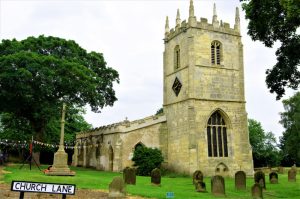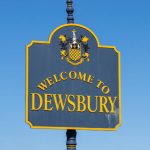Welcome to Whitgift, the picturesque hidden gem of a village located in the East Riding of Yorkshire. Nestled on the banks of the River Ouse, this idyllic destination is only four miles away from Goole and is also part of the commuter belt for the likes of Scunthorpe and Beverley. Thus Whitgift offers a tranquil escape for those looking for a relaxing staycation or day out.
Having said that it still has plenty to offer those of a more adventurous nature too. It has a rich history which is worth exploring and of course, the postcard-like surroundings offer plenty of outdoor adventure opportunities, Overall Whitgift has something for virtually everyone.
Anyway, let’s explore the highlights of this delightful village, starting as always with a little bit of history…
Early Whitgift
Early Settlements: Evidence suggests that the Whitgift area has been inhabited since prehistoric times. Flint tools and artefacts discovered in the region indicate that early settlers engaged in hunting, fishing, and farming in the fertile lands along the River Ouse.
The Roman Era:
During the Roman occupation of Britain, Whitgift and its surroundings fell within the territory of the Brigantes, a Celtic tribe. The Romans established a presence in the region, leaving behind traces of their influence, such as roads and settlements. Roman artefacts and pottery have been found, suggesting trade and interaction with the local population.
Anglo-Saxon and Viking Influence:
Following the Roman withdrawal from Britain, the Anglo-Saxon era brought new settlements to the area. The name “Whitgift” is believed to have Anglo-Saxon origins, derived from the Old English words “hwit” (white) and “gyft” (a watercourse). The village likely developed as a small agricultural settlement during this period.
The Doomsday Book
Whitgift in the Domesday Book: In the Domesday Book of 1086, commissioned by William the Conqueror, Whitgift was mentioned as “Witgift” with a recorded population of approximately 50 people. The village was held by the Archbishop of York and was home to a church dedicated to St. Mary.
Maritime Connections:
Whitgift’s location on the banks of the River Ouse played a significant role in its history. In the 17th and 18th centuries, the village had connections with maritime trade, particularly through the ports of Hull and Goole. The river served as a vital transportation route for coal, agricultural produce, and other goods.
Agriculture and Rural Life: Throughout its history, Whitgift has been predominantly an agricultural community. The fertile lands surrounding the village supported farming activities, with crops and livestock playing a central role in the local economy. Agriculture and rural traditions continue to be important aspects of Whitgift’s identity.
Modern Whitgift:
In recent times, Whitgift has retained its rural character and is renowned for its picturesque countryside and tranquil atmosphere. The village attracts visitors seeking a peaceful retreat and opportunities for outdoor activities such as walking, cycling, and birdwatching.
Whitgift’s rich history, from early settlements to its connections with the Romans, Anglo-Saxons, and maritime trade, reflects the diverse influences that have shaped the region. Exploring Whitgift allows visitors to delve into the past and appreciate the village’s enduring heritage in the heart of Yorkshire.
Things to Do
If you decide to take a trip to Whitgeft here are a few things you should look out for…

Image: Peter is Shaw 1991/Shutterstock.com
- St Mary Magdelene Church. This is a notable local landmark that dates back to the 13th century. This ancient church boasts impressive architectural features and serves as a fascinating testament to the village’s historical heritage. Take a moment to appreciate the intricate stained glass windows and explore the peaceful churchyard, which provides a serene atmosphere for contemplation.
- Explore The River Ouse: The village of Whitgift is blessed with its proximity to the River Ouse, offering visitors a range of recreational activities. Enjoy a leisurely stroll along the riverbanks, take a boat trip, or try your hand at fishing. The tranquil waters and scenic landscapes create a perfect setting for relaxation and connecting with nature. Keep an eye out for the diverse birdlife that calls this area home, as it’s a haven for birdwatchers.
- Whitgift Alpacas: For a unique and memorable experience, make sure to visit Whitgift Alpacas. Located just outside the village, this family-run alpaca farm allows you to interact with these fascinating creatures. Take a guided tour and learn about alpaca husbandry, their wool, and their gentle nature. The farm also has a shop where you can purchase alpaca-related products as souvenirs to remember your visit.
- Nature Reserves: Nature enthusiasts will be delighted to discover the numerous nature reserves in the vicinity of Whitgift. The nearby Blacktoft Sands RSPB Reserve is a must-visit for birdwatchers, offering the opportunity to spot rare species such as marsh harriers and avocets. The reserve features well-maintained trails and bird hides, allowing visitors to observe and appreciate the rich avian diversity of the area.
- Walking and Cycling: Whitgift and its surroundings are a paradise for walkers and cyclists. Explore the scenic countryside on foot or hop on a bike and discover the charming lanes and country paths. The village is conveniently located near the Trans Pennine Trail, a long-distance path stretching across the country, offering opportunities for extended walking and cycling adventures. Take in the beauty of the rolling landscapes, picturesque villages, and abundant wildlife as you embark on your outdoor explorations.
- Local Cuisine and Pubs: Indulge in the local flavours of East Riding by visiting the charming pubs and eateries in and around Whitgift. Sample traditional Yorkshire dishes such as Yorkshire pudding, locally sourced seafood, and regional ales. Enjoy the warm hospitality and friendly atmosphere that is characteristic of rural village life. Don’t miss the chance to engage with the locals, who will gladly share stories and insights about the area.
Famous People
Whitgift does not have a long list of famous people associated with it, there are a few individuals worth mentioning:
- George Calvert (1579-1632): George Calvert, also known as Sir George Calvert, was an English statesman and one of the key figures in the establishment of the Maryland colony in North America. He was born in Whitgift and later served as Secretary of State under King James I. Calvert’s efforts in colonial ventures and his role in the founding of Maryland make him a significant historical figure.
- Sir John Hotham (1589-1645): Sir John Hotham was an English politician and military commander during the English Civil War. He was born in Scarborough, but his family-owned property in Whitgift. Hotham played a prominent role in the early stages of the war, notably by denying King Charles I entry into the city of Hull, thereby demonstrating Parliament’s resistance to royal authority.
Conclusion:
Whitgift, East Riding of Yorkshire, offers a delightful escape into the English countryside. From its historic landmarks and scenic riverbanks to its nature reserves and outdoor activities, this tranquil village has much to offer for visitors seeking a serene retreat. Immerse yourself in the beauty of nature, discover the local wildlife, and relish the warmth of the community. Whitgift is a true haven for those who appreciate the simple pleasures of life and the wonders of the natural world.





